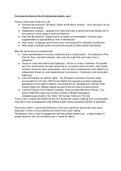The Case for reform of the UK Democratic System - pg 4
Positive Democratic Features of UK:
● Devolved governments (Scotland, Wales and Northern Ireland) - more decisions can be
made by local people
● Independent Judiciary - separate from other branches of government that uphold rule of
law a protect a wide range of personal freedoms
● Free and fair elections - largely free of corruption and intimidation, in recent years
supplemented by opportunities to vote in referendums
● Free media - challenges government policy and exposes the misdeeds of politicians
● Wide range of political parties and pressure groups to which people may belong
Why UK can be seen as undemocratic:
● Under representation of minority viewpoints due to voting system - HoC elected by First
Past the Post, mismatch between votes cast and seats that each party wins in
parliament
● House of Lords lacks democratic legitimacy - House of Lords is unelected. The greater
part of its membership has been appointed by successive prime ministers, with smaller
numbers chosen by other party leaders, and non party crossbenchers since 2000 by an
independent House of Lords Appointments Commissions. Continues to lack democratic
legitimacy
● Lack of Protection for citizens’ rights - The European convention of human rights,
incorporated into UK law (1998 Human Rights Act) arguably provides inadequate
guarantees for the rights of citizens. Governments can ‘derogate from’ articles of the
Human Rights Act, officially stating that part of the Act does not exist anymore.
● Control of Section of the Media by wealthy, Unaccountable Business Interests - E.g -
power of Murdoch group has owned a number of British newspapers
simultaneously,including The Times, The Sunday Times and The Sun
There is also a widely held belief that the UK’s democratic system suffering from a participation
crisis due to lack of engagement with political system among significant section of population
Democratic Deficit - a perceived deficiency in the way a particular democratic body works,
especially in terms of accountability and control over policy making
Participation Crisis -a lack of engagement with the political system (e.g - a large number of
people refuse to vote, join a political party or stand for office)
,Voter Turnout
● Means that governments are elected on a reduced share of the popular vote, thus calling
the strength of their mandate into question
● The average turnout at general elections from 1945-1997 was 76%, since then it has
been lower (2001 =59%) but it did rise to 69% in 2017
● The percentage for 2001 was the lowest since WW1 in 1918
● Turnout is even lower, as a rule, in so called ‘second-order’ elections, such as those for
the devolved bodies in Scotland, Wales and Northern Ireland, and in local council
elections
○ Average turnout in local elections May 2016 = 33.8%. Voters see these less
powerful bodies as unlikely to make a major difference
● Turnout in parliamentary by-elections is often low because people are not helping to
choose a government
○ Feb 2017 - Stoke on Trent by-election only 38.2% turnout
○ Lower than the 49.9% turnout in seat at 2015 general election
○ Copeland by-election saw turnout of 51.3% (down from 63.8% at general
election)
Party Membership
Only 1.6% of electorate belongs to 1 of the 3 main UK wide political parties, 1983 - it was
3.8%.This differs significantly from party to party
● Conservative Party had just under 150,000 members by 2016 - a significant drop from
an estimated 400,000 in the mid 1990s
● Labour Party’s membership increased in the run up to the 1997 election but fell while the
party was in government to around 190,000 members. The election of Jeremy Corbyn as
leader (could have reinvigorated younger people) has been associated with a
remarkable increase in membership, with a total of 515,000 by July 2016
● The Liberal Democrats had about 70,000 members in early 2000. Fell to 49,000 during
the 2010 coalition with Conservatives. I 2016, had recovered to about 76,000 members
and in 2017, membership exceeded 82,000
● Another recent trend has been increase in membership of smaller parties
○ 2015 general election - 24.8% of vote went to parties other than Conservatives,
Labour or Lib Dems
○ SNP 2013 Membership = 25,000 July 2016 = 120,000 Dec 2018 = 125,482
○ Green Party 2013 Membership = 13,800 July 2016 = 55,000
○ UKIP 2013 Membership = 32,400 July 2016 = 39,000
Is there a Crisis of Participation?
● In the last decade, emergence of social media has enabled people to exchange political
views and participate in online campaigns on particular issues, without engaging in the
real world
○ E petitions - 2007 - 1.8m people signed on Downing Street Website against
proposals for road charging
, ○ 2020 - Marcus Rashford’s petition #End Child Poverty has over 1m signatures
○ Increased membership of pressure groups - could indicate that people may be
turning to new methods of expression - could feel that conventional politics has
let them down. Society has become more consumerist - people make up their
minds more on an individual basis; used to making choices between different
options
○ Political Apathy - lack of interest or awareness of political issues or could be due
to ‘hapathy’ (blend of happiness and apathy) - people generally content and don’t
seem to need a political change
○ May possibly be why there was low turnout in 2001 and 2005(booming economy,
more people content probably) compared to 2010 election (much less optimistic
economic background)
● Also depend on issue at stake - Scottish independence referendum had 84.6% but AV
referendum had only 42%
● Also negative public perception of politicians:
○ Public trust in politicians has been undermined for example, by sexual
harassment allegations
○ 2009 parliamentary expenses scandal - Daily Telegraph published evidence of
widespread abuse of system that allowed MPs to claim expensive living costs - 5
former MPs and 2 members of HoL sentenced to prison terms
What should be done to reform the system:
Some recent proposals:
● Changing day of election from Thursday to weekend
● Allowing people to vote anywhere in their constituency not just at a particular polling
station
● Allowing voting to take place over several days
Voting compulsory Voting voluntary
Is a civic duty and a right - people should be Compulsory voting could lead to participants
engaged - affects their lives simply ranking candidates in a preferential
voting system
Parliament produced that is more Undemocratic to force people to take part in
representative of whole population something that is a choice
Politicians have to run better quality campaigns Would not stop politicians from focusing on
and frame policies with whole electorate in marginal seats and ignoring safe seats
mind
Voters aren’t obliged to vote for 1 of the Compulsory voting does not address deeper
candidates - can still spoil ballot paper or ‘none reasons why people do not vote
of the above’ box could be provided
Government could claim greater legitimacy Could encourage non - serious voting






